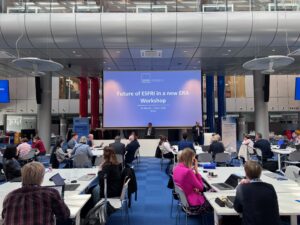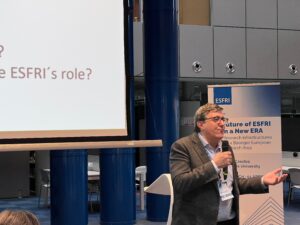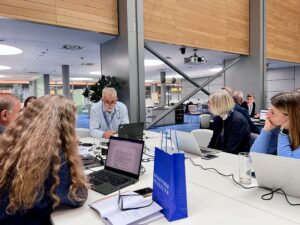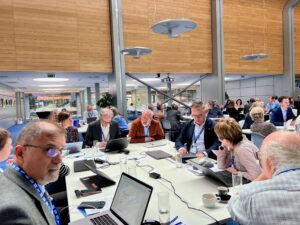The Future of ESFRI: Brno Hosted a Key Workshop and ESFRI Forum Meeting
From March 31 to April 2, 2025, Masaryk University in Brno hosted the workshop “Future of ESFRI in a new ERA,” where experts discussed the future direction of the European Strategy Forum on Research Infrastructures (ESFRI) and its role in the evolving research landscape. The workshop was followed by ESFRI’s regular Forum meeting, with the next meeting set to take place in June 2025 in Kraków, Poland.
ESFRI Chair José Luis Martínez Peña presented an overview of ESFRI’s main activities at the beginning of the workshop, with ESFRI currently having 63 research infrastructures from all scientific fields in its portfolio.
Among ESFRI’s core activities, frequently discussed during the workshop, are the development of the ESFRI Roadmap, the Landscape Analysis which provides an overview of the European RI ecosystem, and the monitoring of ESFRI research infrastructures. Monitoring serves as a tool for tracking and assessing the progress, quality, and sustainability of key European research infrastructures. These activities are crucial for both EU Member States and the European Commission, ensuring that infrastructures listed on the ESFRI Roadmap meet the highest standards and foster international collaboration.
ESFRI, composed of experts from EU Member States and associated countries, agreed on the significance of these activities. A notable recent development was the addition of Canada as a new ESFRI member.
While ESFRI’s core functions remain undisputed, the ESFRI Chair emphasized the need for ESFRI, founded in 2002 to strategically coordinate research infrastructure policy in Europe, to reassess its role and prepare for new challenges.
“It would be beneficial to strengthen our capacity to provide strategic advice to the European Commission, the Council of Ministers, or, as we already do, our national ministries. This could be achieved by reallocating some of the resources currently dedicated to key activities such as the Roadmap, Landscape Analysis, and monitoring. Discussions revealed that a certain level of externalization of these processes could free up ESFRI’s capacity, allowing it to focus more on strategic considerations and advisory functions,” said Jan Hrušák, member of the ESFRI Executive Board from the J. Heyrovský Institute of Physical Chemistry of the Czech Academy of Sciences.
The discussion also touched on expanding ESFRI’s mandate. Should ESFRI also focus on technological infrastructures, digital research infrastructures, or sustainability issues? Suggestions were made to enhance collaboration with the European Commission and other entities, such as ERIC and the EIRO Forum.
While the workshop did not produce definitive conclusions, it initiated a new process of shaping ESFRI’s future. A summary report based on the discussions will be prepared to inform future steps and strategic decisions.
The ESFRI Forum meeting, which followed the workshop, continued discussions on current challenges in European research infrastructures. The next ESFRI meeting is scheduled for June 2025 in Kraków, where the third Stakeholder Forum will also take place, focusing on the sustainability of the research infrastructure ecosystem.
photo (credit: StR-ESFRI)
Author: Vladimíra Coufalová



